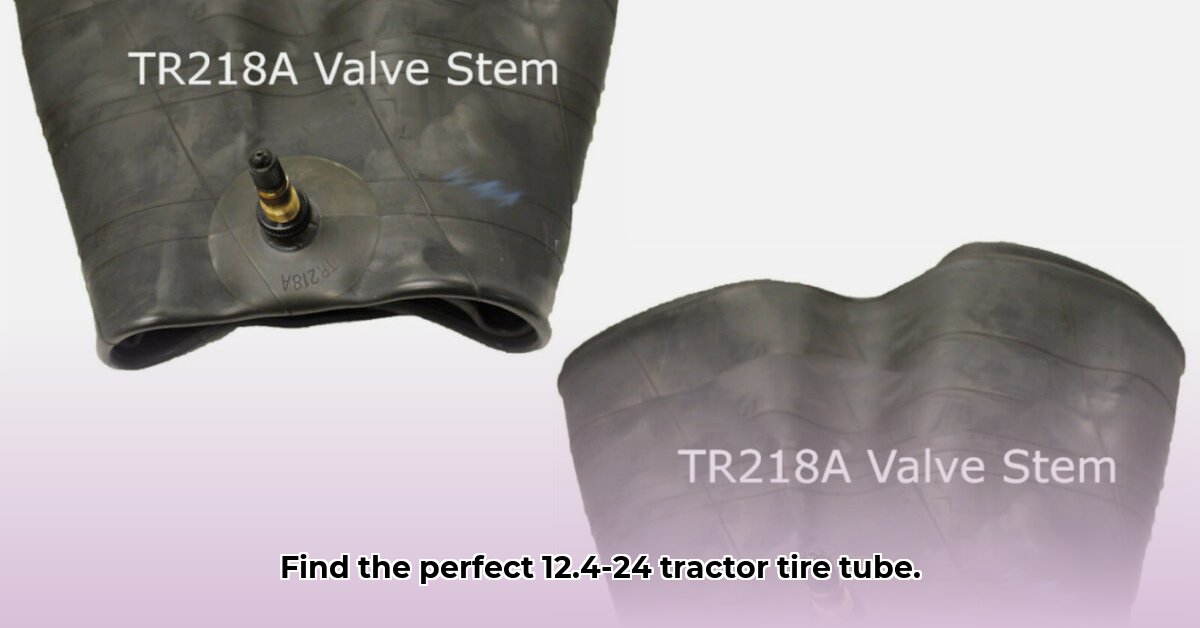
Keeping your tractors operational is paramount, and that includes maintaining properly inflated tires. A flat tire translates to downtime, lost productivity, and increased expenses. However, sourcing replacement inner tubes for large 12.4-24 tractor tires presents unique challenges, particularly when prioritizing environmental sustainability. This guide explores available options, examines the total cost of ownership (TCO), and offers actionable strategies for building a more sustainable future. For more information on tractor tire sizes, check out this resource on 16-inch tractor tires.
Understanding the Need for Sustainable Inner Tubes
Frequent tractor tire inner tube replacements impose significant economic and environmental burdens. Beyond the immediate cost of a new tube and labor, there's lost productivity to consider. Downtime directly impacts farm profitability. Additionally, discarded inner tubes contribute to landfill waste and environmental pollution. A comprehensive approach to sustainability necessitates a shift towards considering the total cost of ownership (TCO), encompassing initial purchase price, lifespan, disposal costs, and environmental impact. Currently, a lack of readily available lifecycle data makes accurate TCO comparisons difficult. This data gap hinders informed decision-making for both farmers and manufacturers.
Exploring Your Options: Air Loc and Rubbermaster – A Closer Look
Two prominent brands in the 12.4-24 tractor tire inner tube market are Air Loc and Rubbermaster. Air Loc tubes are notable for their compatibility with both bias-ply and radial tires, offering flexibility for farmers with diverse equipment. While Rubbermaster often advertises extended warranties suggesting superior durability, detailed information regarding their production methods, materials, and warranty specifics remains limited. This lack of readily accessible data prevents a thorough, objective comparison between the two brands. Further investigation into manufacturing processes and material composition across various brands is critical.
Building a More Sustainable Future: Actions for All Stakeholders
Achieving sustainability in tractor tire inner tube production and usage requires a collaborative effort involving manufacturers, farmers, and regulatory bodies.
For Tractor Manufacturers:
Prioritize Durability in Design: Implement robust design principles and material choices to extend inner tube lifespan, minimizing the frequency of replacements.
Embrace Sustainable Materials: Explore and utilize eco-friendly materials like bio-based rubber or increase the use of recycled rubber in manufacturing.
Develop Responsible End-of-Life Solutions: Establish effective recycling programs or other environmentally conscious disposal methods for worn-out tubes.
For Farmers:
Evaluate Total Cost of Ownership (TCO): Consider not only the purchase price but also the long-term costs, including labor, potential downtime, and environmental impacts when choosing a replacement tube.
Demand Transparency from Suppliers: Seek out manufacturers who are open about their production processes, environmental commitments, and disposal procedures. Look for certifications such as ISO 14001.
Advocate for Change: Request lifecycle assessments (LCAs) from manufacturers to better understand the environmental footprint of their products.
For Inner Tube Manufacturers:
Enhance Transparency: Publicly release detailed lifecycle assessments (LCAs) for all products, enabling informed decisions by farmers.
Invest in Innovation: Continuously research and develop more durable and environmentally friendly materials and manufacturing processes.
Promote Eco-Friendly Products: Actively market and prioritize the sale of inner tubes manufactured using sustainable materials or recycled content.
Government and Regulatory Bodies:
Incentivize Sustainability: Provide financial incentives (e.g., tax breaks, grants) to manufacturers developing and utilizing sustainable materials and processes.
Implement Responsible Disposal Regulations: Establish clear guidelines and regulations for the responsible recycling and disposal of tractor tires and inner tubes.
Future Directions and Research Needs
Significant research gaps exist hindering progress towards sustainability within the 12.4-24 tractor tire inner tube sector. Currently, comprehensive lifecycle assessments for many brands are lacking. Further research on material composition, recyclability, and biodegradability is crucial. Additionally, detailed analysis of manufacturing processes, focusing on energy usage and emissions, is necessary. The development and implementation of clear industry-wide standards for labeling and reporting will significantly increase transparency and provide farmers with the data needed to make better informed, sustainable purchasing decisions. This collaborative approach, driven by research and transparency, is key to achieving a more sustainable future. Isn't it time we prioritized both cost-effectiveness and environmental responsibility in our agricultural practices?